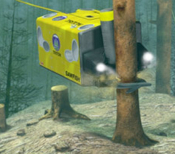 Every time some short-thinking state decides it would be a great idea to dam up a river and swamp dozens (or hundreds) of square miles of forest land, a kazillion trees are drowned in the backwater. Drowned, but not necessarily wasted. Forests die beneath the chilly water, but remain perfectly preserved for many years, and their lumber is still usable. Until recently, it was not possible to harvest drowned forests.
Every time some short-thinking state decides it would be a great idea to dam up a river and swamp dozens (or hundreds) of square miles of forest land, a kazillion trees are drowned in the backwater. Drowned, but not necessarily wasted. Forests die beneath the chilly water, but remain perfectly preserved for many years, and their lumber is still usable. Until recently, it was not possible to harvest drowned forests.
Triton Logging has created a remote-control submersible called Sawfish. Wielding a pair of giant pincers and a 54-inch chainsaw, the craft grabs hold of a tree at the base, jams a balloon into its trunk and inflates it, and cuts through its trunk in a few seconds flat. The tree floats to the surface, where it’s dropped into a “bunk.” Waterlogged trees are hauled off by barge, hundreds at a time. Wired, in Reservoir Logs:
There are environmental advantages to the Sawfish method as well. Conventional aboveground harvesting contributes to deforestation, a cause of global warming that’s responsible for the release of 25 percent of the world’s CO2 emissions. But because underwater trees are already dead, cutting them down doesn’t worsen the situation. And with underwater logging, there are no unsightly clear-cuts and no spotted owls to worry about.
The supply of submerged trees is immense:
Most salvage loggers believe that reservoirs conceal 200 million to 300 million trees worldwide. “That’s a low estimate,†Godsall says. “We’re continually discovering reservoirs with trees in them. There’s one in Brazil called Tucurui with $1 billion worth of timber.â€

>>There’s one in Brazil called Tucurui with $1 billion worth of timber
dood! why allow straight (angle bracket) html, instead of square-bracket equivalent? my normal quoting method (in absence of a GUI quoter or whatever) gets rendered as html, so half my comment is invisiible.
ok. so the above should say…
==================================
[OP]There’s one in Brazil called Tucurui with $1 billion worth of timber[end]
the wannabe luthier in me is DROOOOLLLLLIN!!!!!
Leave a Reply
Ah… you’re thinking of markdown, or bbcode, as used on some discussion forums? I haven’t seen that used on weblogs before, but betcha any money there’s a WP plugin available to parse it. I’ll have a look, thanks for the suggestions.
Luthier heaven, hadn’t thought of that. Hmm… let’s go into bidniss.
You realize that without reservoirs, the area you live in would be uninhabitable by anywhere close to the number of people living in it today, right? Hetch-Hetchy destroyed an area as beautiful as Yosemite, perhaps more so, and even so, every day you reap the rewards.
There’s a balance to be struck, and saying that every reservoir is bad is as imbalanced as saying smog is good.
-Jim
baald, is this what you have in mind for an alternate formatting syntax? (Markdown). Or is it more like this?
I think one of the reasons these alternate markup syntaxes haven’t taken off is exactly this sort of question. If some sites use HTML, others use Markdown, others use BBCode, it becomes very confusing for users, who now need to learn three different syntaxes if they post in a lot of places. HTML is a bit messier, but only a bit (I honestly don’t think these alternate syntaxes are much easier to learn or use than plain old HTML). May as well stick to the standard.
What I should do is set up some clicky widgets for common formatting – bet there’s something that would let me borrow the widgets from the WP back-end.
Jim, absolutely. Dams are confusing as hell – huge pros and cons on either side. Here’s beautifully laid out article on our absolute dependence on dams, and on their maddening destructiveness.
I’m guessing you’re thinking that I think all dams are bad because I used the phrase “short sighted?” Well, they are short sighted. We build them to enable modern technological civilization for a few decades, or a couple generations, before they silt up and become little more than enormous expensive waterfalls, after having wrought untold damage on the landscapes and peoples they displaced. They are the absolute epitome of human short-sightedness. And yet, not all bad. Dams are monumental paradoxes.
I don’t remember the name so I don’t have a link, but I’ve heard there’s a thriving business using divers to recover sunken logs in the great lakes. Apparently they were lost over the sides of ships as they were being transported over the last 100 years, and lay perfectly preserved in the cold fresh water.
The interesting thing to me was that this company primarily sells to artists and fine woodworkers; the logs were cut from long-gone old-growth forests so they are much larger and better quality than the wood available in the rapidly-grown managed forests of today. (It’s sad and scary that these are all that’s left of what once covered much of the US).
I read about this in Wired. A very cool idea, and it gives my latent Green a warm-fuzzy, too – what with finding a way to use all that perfectly preserved lumber that’d go to waste otherwise.
You and Jim also make good points about dams in general. I’ve lived “out West” (Colo., not Calif., but still…) and am intimately aware of the perennial water problems there. It was bad enough in the Mountain West, and worse in Phoenix, but with the population in Calif. ?! Yikes!